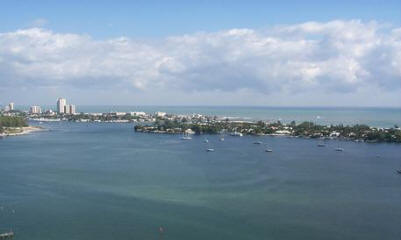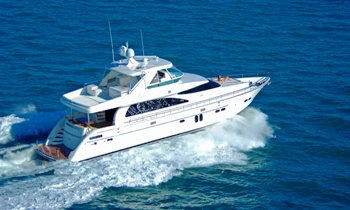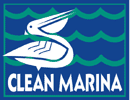|

Florida Boating
Boating Safety Education Requirements
How to Register Your Boat in Florida
How Old
Do You Have To Be To Drive a Boat in Florida?
Minimum Equipment Requirements
The Florida
Marine Patrol is now
Florida Fish and Wildlife Commission (FWC). Phone: 850-488-4676. For a list of
regional offices and phone numbers, visit our
Boating Safety page.
Florida's Waters
Florida has over 8,000 miles of coastline and 4,500 square miles of
inland waterways, making it a paradise for boaters! From mega-yachts to
wooden skiffs, having a boat is as normal as having a car for some
Floridians.
Also known as "the ditch," the Intracoastal Waterway (ICW) is
a natural but dredged channel that extends 500 miles down the
east coast of Florida to the tip of the Keys. It's a very
popular boating route that runs through rivers, creeks and
dredged canals. It is maintained by the
Florida Inland Navigation District.
The 135-mile
Okeechobee Waterway, which cuts through the state, is another
popular boating route, especially during the summer. It runs
along the St. Lucie Canal from Stuart, across Lake Okeechobee
and then on to Sanibel Island via the Caloosahatchee River.

Anchoring Restrictions
New Florida Law Eases Anchorage Restrictions
Boaters cruising Florida waters may find it easier to anchor for
extended periods of time in a number of cities where local ordinances
limited anchorage to as little as 48 hours.
Florida Governor Charlie Crist signed H.B. 1423, a
general legislative package for the Fish and Wildlife Conservation
Commission that includes a provision that prevents local Florida
communities from forcing boaters to leave an anchorage unless the boat
is a live-aboard vessel. The law specifically defines a live-aboard
vessel as one that is used solely as a residence and not for navigation;
one represented as a place of business; and/or one that is declared to
be a domicile. The new law also prohibits local governments from
regulating anchorage outside of established mooring fields unless the
boat is a live-aboard vessel.
Many marine organizations have
advocated for clarification within the law since 2006, when Miami Beach
set an anchorage limit of seven days within any 30 day period. Ft.
Lauderdale, Daytona Beach, Gulfport, Marco Island and other coastal
communities soon enacted similar restrictions, with the most restrictive
law being a 24-hour window for boaters anchoring in Ft. Lauderdale.
“This law will not only have a positive impact on boaters in the area,
but generate revenue for local businesses by allowing boaters more
freedom to anchor,” said David Dickerson, NMMA director of state
government relations. “We are encouraged by this law’s effort to make
Florida more boater-friendly than ever.”
Great
Places To Anchor Out
Miami - Across from
Baker's Haulover Inlet in front of Florida International University; in
front of Watson Island, by the cruise ships at the port; the anchorage
in Boca Chica Harbor or pick up a free mooring on the bayside by Sand's
Cut.
Palm Beach County - Peanut Island across from Lake Worth
Inlet.
Charts
Technology has caught up with
charts & maps and many can now be downloaded. Always have the latest
version, as shoals, wrecks and other navigational influences can cause
changes.
Captain's License
Thinking of becoming a charter captain or
running a water taxi? You'll need a license from the United States Coast
Guard which can be obtained from many schools and organizations that
offer maritime
training & education in Florida.
Paying for Your Boat
If you plan to finance your vessel, you'll
need a down payment of roughly 10% - 20%, but often there are programs
available through various
manufacturers that could allow you to qualify for less, or zero-down
on new boat specials. If you choose to get
financing through a marine lender, you can usually get longer terms
on boat loans than local banks and credit unions and your monthly
payments are likely to be much lower than you have expected.
Ownership Alternatives
There are several alternatives to owning
your own boat; including
Boat Renting & Leasing, and
Charters. Yacht charters are obviously going to be far more
expensive that renting a boat for an afternoon outing, but if you are
considering chartering the yacht of your getaway dreams, keep these tips
in mind:
-
Use a professional
Yacht
Broker
-
Ask about special
foods and
provisions
-
Budget: Charter costs
are not all inclusive. Ask about fuel, gratuities and extra
activities.
-
Number in your party:
The maximum number of charter guests allowed by law is 12.
-
Activities: Ask if
there will be equipment for snorkeling, scuba diving, kayaking, etc.
Different yachts often specialize in different pastimes.
|

Florida's Ports
Port of Pensacola
Port of Panama City
Port St Joe
Port of Tampa
Port of St Petersburg
Port Manatee
Port of Key West
Port of Miami
Port Everglades (Ft Lauderdale)
Port of Palm Beach
Port of Ft Pierce
Port Canaveral
Port of Jacksonville
Port Fernandina
Special Interest Phone Numbers
Boat Documentation
National Vessel Documentation Center
800-799-8362
Search
Documentation and Registration Companies
Vessel Licensing
305-536-6549
Department of Business & Professional Regulation
Yacht Broker
Licensing and Regulation: 850-487-1122
Donate your boat. Get a tax deduction.
Chapman School of Seamanship.
United States Customs
When you return from boating in a foreign
country, you must obtain clearance before anyone on the vessel can
disembark. Since 9/11, these rules have been strictly enforced and not
following the procedures can be costly. Use the numbers below to call
from any marina or private dock and have your boat registration number
available.
Small Vessel Reporting Number
800-432-1216
Alternate Number
800-451-0393
Florida Inlets
Banana River South Inlet
Big Sarasota Pass Inlet
Boca Raton Inlet
South Lake Worth/Boynton Beach Inlet
Port Canaveral Inlet
Fort Pierce Inlet
Government Cut (Miami)
Hillsboro Inlet
Jupiter Inlet
Lake Worth (Palm Beach) Inlet
Longboat Pass Inlet
Matanzas Inlet
Ponce de Leon Inlet
Port Everglades (Ft Lauderdale Inlet)
Sebastian Inlet
St. Augustine Inlet
St. Lucie Inlet

A clean marina is a happy marina! When
choosing a
marina
in Florida, smart boaters look for the Clean Marina flag at marinas that have passed
Florida's requirements for the
Clean Marina
designation.
Burial at Sea
When conducting a burial at sea,
the direction of the wind is of utmost importance. Make sure the ashes
will scatter off the stern properly to avoid obvious embarrassment.
Tradition calls for the vessel to fly it's flag at half mast, and the
following prayer may be used: "Unto Almighty God we commend the soul of
our (brother) (sister) departed, and we commit (his) (her) body to the
deep; in sure and certain hope of the resurrection unto eternal life."
At the words "commit (his) (her) body to the deep," the person holding
the cremated remains then scatters them off the stern of the vessel.
Living Aboard
Chapter 327.02(16), Florida Statues,
narrowly defines "live-aboard vessel" as "any vessel used solely as a
residence," or "any vessel represented as a place of business, a
professional or other commercial enterprise, or a legal residence." In
Florida, "[a] legal residence is the place where a persona has a fixed
abode with the present intention of making it their permanent home." See
our section on
houseboats, or contact a
boat dealer
for where to buy.
Can't find what you're looking for
here? Please contact us and we'll help you
find it! |




